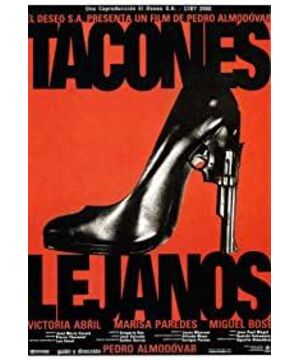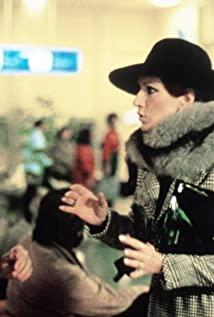Pedro Almodóvar's ninth film "High Heels" presents various problems in the female world, such as mother-daughter relationship, jealousy, and psychological distortion, in a unique and elegant way. The film depicts a less warm side of women's world.
"High Heels" tells people a story that is not novel. The difference is that it puts this story, which has been told thousands of times, on the track of psychoanalysis, making it special.
"Loss of love, jealousy, loneliness, contempt, etc. will lead to crime." The heroine Levika in "High Heels" is in such an atmosphere to degenerate into a murderer. At the beginning, the director used flashbacks to show the audience the living environment of Levika in her childhood.
Teenage Levika murders her stepfather. But she has no guilt in the slightest, and she thinks she is "saving her mother" by doing so. The criminal mentality of the childhood Levika is very simple. She hopes to get the love of her mother and hope that her mother will take her abroad. But my mother went to Mexico alone, and she was gone for 15 years. For Levika, who is so attached to her mother that she can only sleep peacefully in bed at night when she hears the sound of her mother's high heels gradually disappearing in the corridor, her mother's actions further contributed to her distortion. Revica changed from love and admiration for her mother to hatred and jealousy for her mother. It can be said that she grew up in the interweaving of love and hatred for her mother. As an adult, Levika sees her mother as her rival, and her marriage to her mother's past lover is a trump card for revenge on her mother. After her mother returned to China, when Revica found that her husband, Manuel, still loved her mother, and proposed to divorce her, she felt that she was once again despised and feared of failure. So she went to extremes and shot Manuel. Revica's re-offending is obviously directly related to her living environment. From a psychological point of view, Levika feels that she has committed a crime for killing Manuel, and at the same time she has a sense of "satisfaction" , this kind of psychology arises from revenge on the mother.
Almodovar depicts the complex emotions of Levica in a very delicate way, allowing the audience to understand the psychological factors of Levica's tendency to commit crimes, and then make the audience have a mentality of "understanding" or "sympathy" for her.
Another woman portrayed in "High Heels" is Beige. Begie was born in poverty, and she went through hard work to become a well-known singer. Therefore, she cherishes hard-won achievements and is unwilling to become a man's accessory. In dealing with men, she is not strong but weak. Beige's character and the social environment in which she lives determine that she is not a good wife and mother. She left her daughter for more than ten years and did not give her the motherly love that she deserved. Invisibly, she became the direct responsible person for the distortion of Levika's character. With Beige on the verge of death, her motherhood begins to recover, realizing that the responsibility for killing Manuel cannot be left to Levica alone. So she took the blame for her daughter before she died. Begie died wearing the halo that the choreographer crowned her.
Almodovar's mother is a person with serious character flaws. Beige is a simple and complex woman, but her inner emotions are rich. She loves her daughter, but she doesn't take on the responsibilities of a mother. Beige is a world away from the self-sacrificing, humiliating, perfect mother in Hollywood movies. In particular, Beige's independent character, which does not depend on men, gives a hint of "female liberation". At the same time, it alludes to the fact that in Spain, women are in danger of losing their families if they want to succeed in their careers.
Almodovar has repeatedly created "imperfect" female images in his works. These characters have various defects due to their living environment and their own problems. Such as: Gloria, the heroine of "Why Do I Have to Be Like This", Peba and Lucia in "The Woman Who Crashed"... These characters in Almodóvar's films form a group of defective women, who gather together Good and evil, good and evil in one. For their emotions, their nerves are close to collapse. They are not independent individuals, and their words and deeds are dictated by society and their families. It can be seen from these films that Almodóvar tried to express his views on the world of women from the aspects of psychology, morality, humanity, etc. by shaping the characters of these flawed women, and to show that his "nothing is bad in the world" and bad" view.
Judge Dominguez in the film is a man who occupies a considerable proportion in this film, and he has multiple personalities. He was a well-dressed judge when he put on a beard, sunglasses, and a straight suit; he changed into women's clothes, donning wigs, earrings, and fake breasts when he imitated Beige in nightclubs under the pseudonym Lettal; When he moved in with Paula, he changed his name to Hugo. In life, he has different psychological and behavioral manifestations in different occasions or in front of different objects. Although he explained to Levika that he did it to solve a case and needed to create and play his own role. But in reality he is obsessed with his character, living a life of disguise, hiding his true face even from his mother. After falling in love with Levika and learning that Levika was pregnant with his child, he took off the "mask" in front of Levika. Judge Dominguez's multiple personalities are also closely related to society and living environment.
Almodóvar uses suspense and sensationalism to enhance the visibility of "High Heels". When Manuel was killed (the film did not directly describe Manuel's death, but replaced it with gunshots from Manuel's villa), the audience naturally wondered who the murderer was. The film handles this suspense from time to time, and it continues until the end. In the film, Levica talks about Manuel's death four times, which can also be called Levica's four "confessions". The first time, the day after Manuel's death, Judge Dominguez arraigned three women involved in Manuel's death: Isabel, Levica, and Begie. Levika, like a wounded lamb, denies that she is the murderer. The second time was that night, when Revica suddenly admitted publicly on the TV news that she had shot Manuel. But she avoided the details of the crime. The third time, the judge arranged for Beige to see her daughter, and Levika excitedly told her mother that she did not kill her husband. Her on-television admission was intended as revenge. The fourth time, when Begi was critically ill, Revica told her mother about the shooting of Manuel. These four "confessions" run through the film, not only forming suspense, but also playing a sensational role, allowing the audience to understand the trajectory of Levika's thinking step by step, and have a deep understanding of her criminal psychology. And then play a finishing touch to the three-dimensional shaping of this character.
"High Heels", like the rest of Almodóvar's films, absorbs the artistic techniques of modern advertising. His handling of the film's subtitles is unique, consisting of high-heeled shoes, women's feet, pistols, cameras and other advertising paintings. These advertisements are colorful and bright, and they themselves form a story with concise and vivid advertising language, thus highlighting the theme, namely: women, murderers and emotional entanglements related to high heels.
In "High Heels", Almodovar used more "flashback" shots, which played a role in showing off the characters' unspeakable secret mentality. In addition, the use of music in the film is also unique, with the weeping trumpet sound and the deep, shocking drum sound at the beginning of the film, and the emotional pop songs "Think of Me" and "One Year of Love" run through The film is always there. The songs in the film are integrated with the storyline, highlighting and rendering the inner emotions of the characters.
Actress Victoria Avril, who plays Revica, is a household name in Spain, starring in Lovers, Bind Me, The Most Beautiful Night, and more. She has won the Best Actress Award at the Berlin Film Festival and the San Sebastian Film Festival, as well as the French César Award twice. In "High Heels," Avril brings Revica's complex mentality and unpredictable behavior to the fore.
View more about High Heels reviews











